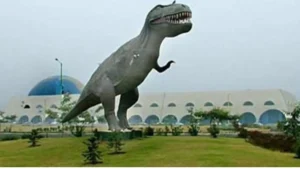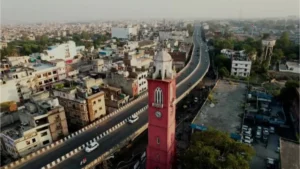Scotland‘s largest-ever repatriation of items from a single collection, Glasgow’s museums have returned seven artefacts to India, including a stone door jamb stolen from a Hindu temple in Uttar Pradesh. The transfer of ownership was formalised at a ceremony held at the Kelvingrove Art Gallery and Museum, Scotland in the presence of Acting Indian High Commissioner to the UK Sujit Ghosh.
Bank Maha Pack includes Live Batches, Test Series, Video Lectures & eBooks
Scotland’s Glasgow Life: About
Glasgow Life, a nonprofit organisation that manages the city’s museums. Another example of Glasgow’s commitment to atoning for the past and being transparent about how artefacts entered the city’s museum collections is the agreement struck with the Indian government.
Artefacts to be returned by Scotland:
- A ceremonial Indo-Persian sword, or talwar, said to be from the 14th century as well as an 11th-century carved stone door jamb seized from a temple in Kanpur are among the seven artefacts that will now return to India by Scotland.
- The majority of the items were taken from temples and shrines in several northern Indian states during the 19th century, while one was bought after being stolen from the owner.
- According to Glasgow Life, all seven artefacts were donated to the city of Glasgow’s collections in Scotland.
- After the cross-party Working Group for Repatriation and Spoliation’s request to return 51 objects to India, Nigeria, and the Cheyenne River and Pine Ridge Lakota Sioux tribes in South Dakota, US, was authorised in April, the transfer of ownership ceremony took place.
- The government of India and Archaeological Survey of India (ASI) delegations were given the chance to see the items at Glasgow Museums Resource Centre, where they are being “safely housed,” after the meeting at Kelvingrove Art Gallery and Museum, Scotland.
According to Bailie Annette Christie, Chair of Glasgow Life and Convenor for Culture, Sport, and International Relations for Glasgow City Council, “it is an honour to host Indian dignitaries in our city for such an important event. The repatriation of these objects is significant from both a historical and cultural standpoint for Glasgow and India.”
Scotland-India: About the deal
- The deal made with the Indian government is another illustration of Glasgow’s dedication to making amends for the past and being open about how artefacts got into the city’s museum collections.
- Jaspreet Sukhija, the First Secretary at the Indian High Commission in London, and Bijay Selvaraj, the Consul General of the Consulate General of India in Edinburgh, were also members of the Indian delegation.
- The Indian delegation’s visit was a significant step in the city’s efforts to repatriate more than 50 cultural artefacts to their rightful owners’ descendants.
- This is the largest-ever repatriation of items from a single collection in Scotland.
- It is returning 19 Benin bronzes to Nigeria. This work has been ongoing ever since it was determined that the artefacts purchased through gifts, bequests, and auctions were stolen from holy places and ceremonial buildings during the British Punitive Expedition of 1897.




 Which City is known as the Science City ...
Which City is known as the Science City ...
 Which District of Punjab is known as the...
Which District of Punjab is known as the...
 Open-Source & Made for India: VoicER...
Open-Source & Made for India: VoicER...








